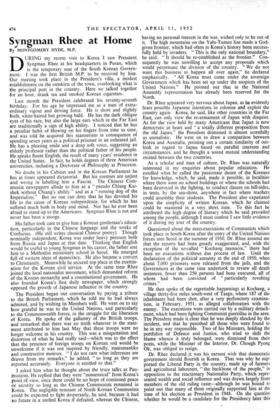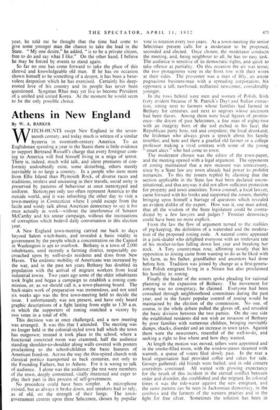Syngman Rhee at Home
By MONTGOMERY HYDE, M.P.
DURING my recent visit to Korea I saw President Syngman Rhee at his headquarters in Pusan, which is the temporary seat of the South Korean Govern- ment. I was the first British M.P. to be received by him. Our meeting took place in the President's villa, a modest establishment on the outskirts of the town, overlooking what is the principal port in the country. Here we talked together for an hour, drank tea and smoked Korean cigarettes.
Last month the President celebrated his seventy-seventh birthday. For his age he impressed me as a man of extra- ordinary vigour and driving force. He is short and slightly built, white-haired but growing bald. He has the dark oblique eyes of his race, but also the large ears which in the Far East are traditionally a sign of high ability. I noticed that he has a peculiar habit of blowing on his fingers from time to time, and was told he acquired this mannerism in consequence of spending seven years as a political prisoner in an unheated jail. He has a pleasing smile and a deep soft voice, suggesting an elderly professor rather than the political father of his people. He speaks fluent English, the result of many years' residence in the United States. In fact, he holds degrees of three American universities, including a Doctorate of Philosophy at Princeton.
No doubt in his Cabinet and in the Korean Parliament he has at times appeared dictatorial. But his enemies are unjust and wrong in labelling him a Fascist. The Chinese Com- munist newspapers allude to him as a "pseudo Chiang Kai- shek without Chiang's ability" and as a "running dog of the Imperialists." But no One can deny that he has devoted his life to the cause of Korean independence, for which he has suffered much both in body and mind. Nor has he ever been afraid to stand up to the Americans. Syngman Rhee is not and never has been a stooge.
His father took care to give him a Korean gentleman's educa- tion, particularly in the Chinese language and the works of Confucius. (He still writes classical Chinese poetry). Though nominally independent, Korea was under heavy pressure both from Russia and Japan .at that date. Thinking that English would be useful to young Syngman in his career, the father sent him to a Methodist missionary school in Seoul. He emerged full of western ideas of democracy. He also became a convert to Christianity. Meanwhile he secured top place in the examin- ation for the Korean civil service. At the same time Rhee joined the local nationalist movement, which demanded reform of the Korean monarchy and a constitutional government. He also founded Korea's first daily neNkspaper, which strongly opposed the growth of Japanese influence in the country.
The President began our conversation by paying a tribute to the British Parliament, which he told me he had always admired, and by wishing its Members well. He went on to say how grateful he was to the United Nations, and particularly to the Commonwealth forces, in the struggle for the liberation of Korea. He spoke of the gallantry of the British troops, and remarked that there was no truth whatever in the state- ment attributed to him last May that these troops were no longer welcome in his country. This was a misquotation and distortion of what he had really said-=which was to the effect that the presence of foreign troops on Korean soil would be unwelcome if it was not inspired by friendly, statesmanlike and constructive motives. "I do not care what inferences are drawn from my remarks," he added, "so long as they are reported accurately. Everyone is entitled to that."
I asked him what he thought about the truce talks at Pan- munjom. He replied that they were "nonsensical" from Korea's point of view, since there could be no hope of continued peace or security so long as the Chinese Communists remained in Korea. The negligible remnant of North Korean Communists could be expected to fight desperately, he said, because it had no future in a unified Korea if defeated, whereas the Chinese, having no personal interest in the war, wished only to be out of it. The high mountains on the Yalu-Tumen line made a God- given frontier, which had often in Korea's history been success- fully held by invaders. "This is the only national boundary," he said. "It should be re-established as the frontier." Con- sequently he was unwilling to accept any proposals which would perpetuate the division of the country. We do not want this business to happen all over again," he declared -emphatically. "All Korea must come under the sovereign Government which has been set up under the auspices of the United Nations." He pointed out that in the National Assembly representation has already been reserved for the North.
Dr. Rhee appeared very nervous about Japan, as he evidently fears possible Japanese intentions to colonise and exploit the country again. Korea, he said, like other countries in the Far East, can only view the re-armament of Japan with disquiet. As for the view held by many Americans that Japan is now democratic at heart and "a totally different proposition from the old Japan," the President dismissed it almost scornfully as unrealistic. He went on to draw a comparison between Korea and Australia, pointing out a certain similarity of out- look in regard to Japan based on parallel interests and circumstances, and he thought a sound mutual understanding existed between the two countries.
As a scholar and man of culture, Dr. Rhee was naturally interested in my enquiries about popular education. He extolled what he called the passionate desire of the Koreans for knowledge, which, he said, made it possible, in localities where there were no school buildings or where the schools had been destroyed in the fighting, to conduct classes on hill-sides, in tents, by the sea-shore, anywhere in fact where teachers could assemble their students. The President also expatiated upon the simplicity of written Korean, which he claimed could be mastered in a very short time. To this fact he attributed the high degree of literacy which he said prevailed among the people, although I must confess I saw little evidence of it during my tour of the country.
Questioned about the mass-executions of Communists which took place in South Korea after the entry of the United Nations forces into Seoul in the summer of 1950, Dr. Rhee assured me that the reports had been greatly exaggerated, and, with the exception of the so-called " Kochang massacre," there had been no executions without due process of law. Until the declaration of the political amnesty at the end of 1950, when about 7,000 prisoners were released from the jails, and the Government at the same time undertook to review all death sentences, fewer than 250. persons had been executed, all of whom had been convicted of "particularly revolting crimes."
He then spoke of the regrettable happenings at Kochang, a village thirty-five miles south-west of Taegu, where 187 of the inhabitants had been shot, after a very perfunctory examina- tion, in February, 1951, as alleged collaborators with the enemy. The executions were carried out by a military detach- ment, which had been fighting Communist guerrillas in the area. The President made it clear that he was deeply shocked by the incident, and that he -punished all those who were found to be in any way responsible. Two of his Ministers, holding the portfolios of Defence and Justice, who tried to shift the blame whence it truly belonged, were dismissed from their posts, while the Minister of the Interior, Dr. Chough Pyong Ok, was obliged to resign.
Dr. Rhee declared jt was his earnest wish that democratic government should flourish in Korea. That was why he sup- ported the Liberal Party in the country, made up of farmers and agricultural labourers, "the backbone of the people," in opposition to the reactionary Nationalist Party, which repre- sented wealth and social influence and was drawn largely from members of the old ruling caste—although he was bound to point out that many of them originally supported him at the time of his election as President in 1948. On the question whether he would be a candidate for the Presidency later this year, he told me he thought that the time had come to give some younger man the chance to take the lead in the State. "My one desire," he added, "is to be a private citizen, free to do and say what I like." On the other hand, I believe he may be forced by events to stand again.
So far no one has come forward to take the place of this shrewd and knowledgeable old man. If he has on occasion shown himself to be something of a despot, it has been a bene- volent despotism which he has exercised. Certainly his deep- rooted love of his country and its people has never been questioned. Syngman Rhee may yet live to become President of a unified and united Korea. At the moment he would seem to be the only possible choice.



































 Previous page
Previous page